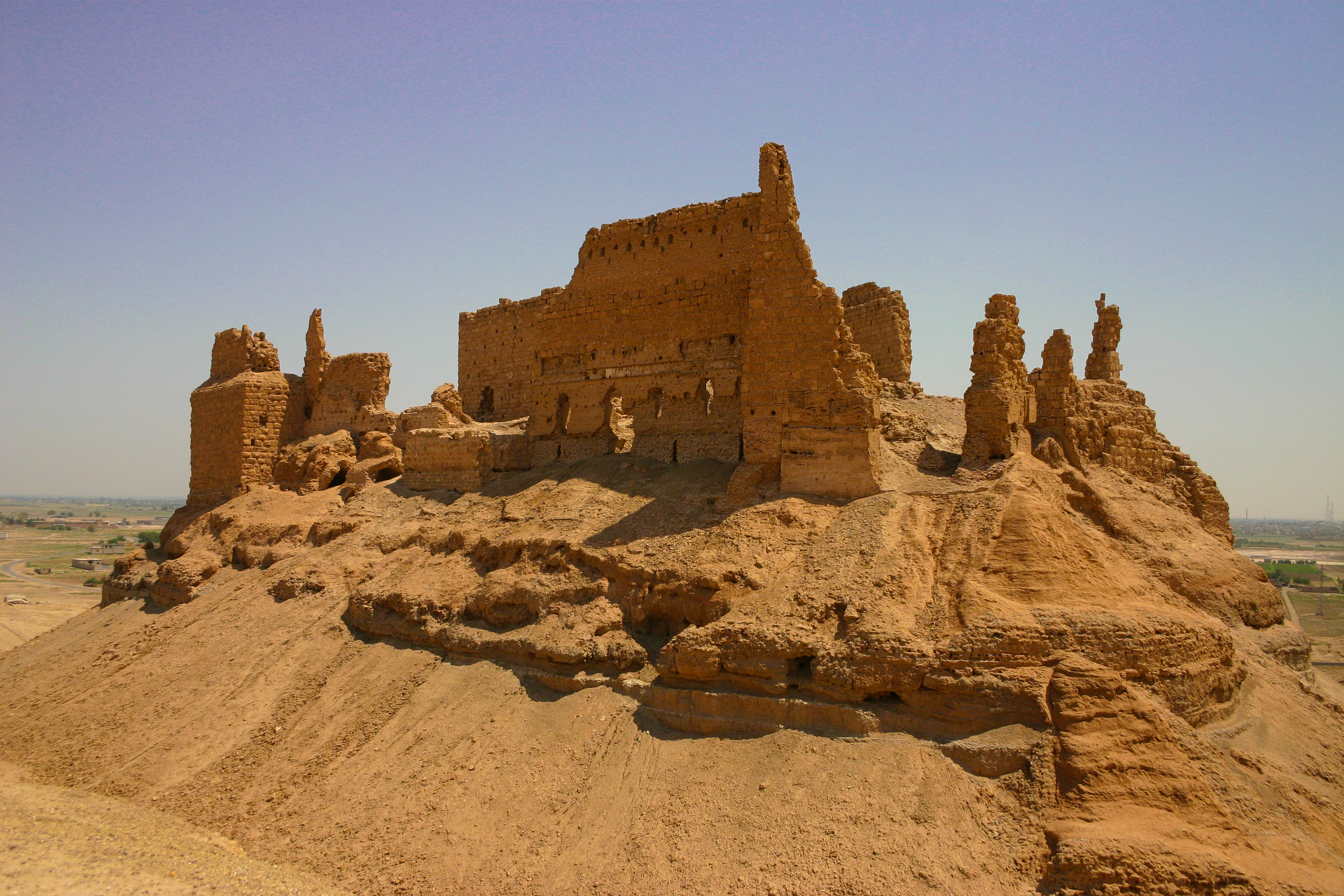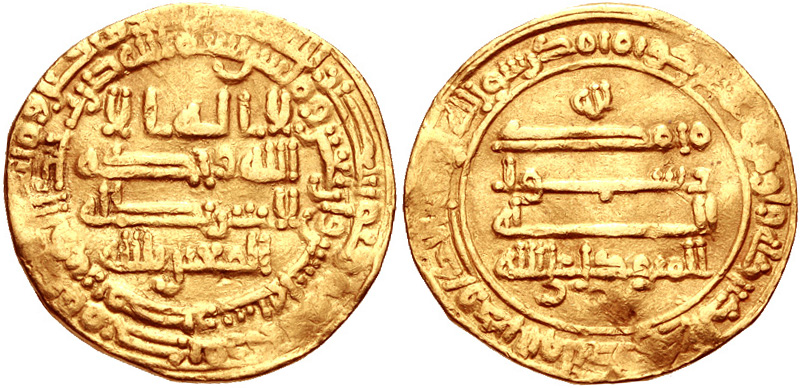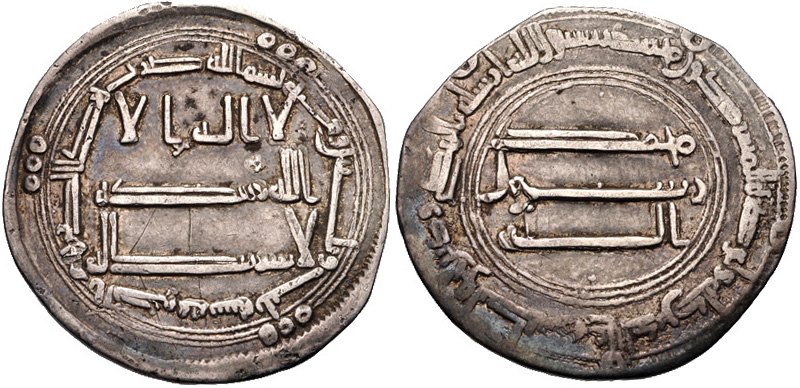|
Malik Ibn Tawk
Malik ibn Tawk ibn Malik ibn 'Attab at-Taghlibi () (died 873) was an Arab Abbasid Caliphate, Abbasid official during the reigns of caliphs al-Wathiq (r. 842–847) and al-Mutawakkil (r. 847–861). He is best known as the founder of the fortress town of al-Rahba on the western banks of the Euphrates, part of the modern-day Syrian town of Mayadin. Biography Malik ibn Tawk belonged to the Arab tribe of Taghlib, Banu Taghlib and traced his lineage to the 6th-century Taghlibi poet warrior Amr ibn Kulthum. His father, Tawk ibn Malik, served as governor of Diyar Rabi'a, the district of the eastern Al-Jazira (caliphal province), Jazira (Upper Mesopotamia) under the Abbasid Caliphate, Abbasid caliph al-Ma'mun (r. 813–833). He also served as a general under al-Ma'mun's predecessor, Caliph Harun al-Rashid (r. 786–809), Some Muslim sources have often incorrectly made the son Malik ibn Tawk to have been the one in the service of Harun and al-Ma'mun instead of his father. Malik ibn Tawk ser ... [...More Info...] [...Related Items...] OR: [Wikipedia] [Google] [Baidu] |
Al-Mutawakkil
Abū al-Faḍl Jaʿfar ibn Muḥammad al-Muʿtaṣim bi-ʾllāh ( ar, جعفر بن محمد المعتصم بالله; March 822 – 11 December 861), better known by his regnal name Al-Mutawakkil ʿalā Allāh (, "He who relies on God") was the tenth Abbasid caliph. He succeeded his brother, al-Wathiq, and is known for expanding the empire to its maximum extent. He was deeply religious, and is remembered for discarding the Muʿtazila, ending the Mihna (a period of persecution of Islamic scholars), and releasing Ahmad ibn Hanbal. He is also known for his tough rule, especially with respect to non-Muslim subjects. He was assassinated on 11 December 861 by the Turkic guard with the support of his son, al-Muntasir, marking the beginning of the period of civil strife known as the " Anarchy at Samarra". Early life Al-Mutawakkil was born on February/March 822 to the Abbasid prince Abu Ishaq Muhammad (the future al-Mu'tasim) and a slave concubine from Khwarazm called Shuja ... [...More Info...] [...Related Items...] OR: [Wikipedia] [Google] [Baidu] |
Al-Ma'mun
Abu al-Abbas Abdallah ibn Harun al-Rashid ( ar, أبو العباس عبد الله بن هارون الرشيد, Abū al-ʿAbbās ʿAbd Allāh ibn Hārūn ar-Rashīd; 14 September 786 – 9 August 833), better known by his regnal name Al-Ma'mun ( ar, المأمون, al-Maʾmūn), was the seventh Abbasid caliph, who reigned from 813 until his death in 833. He succeeded his half-brother al-Amin after a civil war, during which the cohesion of the Abbasid Caliphate was weakened by rebellions and the rise of local strongmen; much of his domestic reign was consumed in pacification campaigns. Well educated and with a considerable interest in scholarship, al-Ma'mun promoted the Translation Movement, the flowering of learning and the sciences in Baghdad, and the publishing of al-Khwarizmi's book now known as "Algebra". He is also known for supporting the doctrine of Mu'tazilism and for imprisoning Imam Ahmad ibn Hanbal, the rise of religious persecution ('' mihna''), and for the ... [...More Info...] [...Related Items...] OR: [Wikipedia] [Google] [Baidu] |
Generals Of The Abbasid Caliphate
A general officer is an officer of high rank in the armies, and in some nations' air forces, space forces, and marines or naval infantry. In some usages the term "general officer" refers to a rank above colonel."general, adj. and n.". OED Online. March 2021. Oxford University Press. https://www.oed.com/view/Entry/77489?rskey=dCKrg4&result=1 (accessed May 11, 2021) The term ''general'' is used in two ways: as the generic title for all grades of general officer and as a specific rank. It originates in the 16th century, as a shortening of ''captain general'', which rank was taken from Middle French ''capitaine général''. The adjective ''general'' had been affixed to officer designations since the late medieval period to indicate relative superiority or an extended jurisdiction. Today, the title of ''general'' is known in some countries as a four-star rank. However, different countries use different systems of stars or other insignia for senior ranks. It has a NATO rank sca ... [...More Info...] [...Related Items...] OR: [Wikipedia] [Google] [Baidu] |
9th-century Arabs
The 9th century was a period from 801 ( DCCCI) through 900 ( CM) in accordance with the Julian calendar. The Carolingian Renaissance and the Viking raids occurred within this period. In the Middle East, the House of Wisdom was founded in Abbasid Baghdad, attracting many scholars to the city. The field of algebra was founded by the Muslim polymath al-Khwarizmi. The most famous Islamic Scholar Ahmad ibn Hanbal was tortured and imprisoned by Abbasid official Ahmad ibn Abi Du'ad during the reign of Abbasid caliph al-Mu'tasim and caliph al-Wathiq. In Southeast Asia, the height of the Mataram Kingdom happened in this century, while Burma would see the establishment of the major kingdom of Pagan. Tang China started the century with the effective rule under Emperor Xianzong and ended the century with the Huang Chao rebellions. While the Maya experienced widespread political collapse in the central Maya region, resulting in internecine warfare, the abandonment of cities, and a nort ... [...More Info...] [...Related Items...] OR: [Wikipedia] [Google] [Baidu] |
873 Deaths
__NOTOC__ Year 873 ( DCCCLXXIII) was a common year starting on Thursday (link will display the full calendar) of the Julian calendar. Events By place Europe * Carloman, son of King Charles the Bald, is hauled before a secular court and condemned to death – for plotting against his father. He is blinded, but avoids imprisonment by escaping to the East Frankish Kingdom, where his uncle, Louis the German, gives him protection. * Al-Andalus: The city of Toledo (modern Spain) rises up for a second time against Umayyad rule, due to ethnic tensions over two years. Britain * The Danish Great Heathen Army, led by the Viking leaders Halfdan and Guthrum, attack Mercia and capture the royal centre at Repton (Derbyshire). The Vikings establish an encampment with a U-shape ditch, on the south bank of the River Trent and spend the winter there.* Abbasid Caliphate * Azugitin, Abbasid caliph Al-Mu'tamid appointed Azugitin as governor of Mosul with deputies. * Muhammad ibn Ali ... [...More Info...] [...Related Items...] OR: [Wikipedia] [Google] [Baidu] |
Al-Rahabi
Al-Rahabi ( ar, الرحبي) or Rahabis is an Arab clan. It is a branch of the Taghlib tribe. Al-Rahabi are cousins with the tribe of Anizzah, Rahba and Khabur and the cities of Abu Kamal and Asharah, and a large section in Iraq in Anbar and Tikrit Tikrit ( ar, تِكْرِيت ''Tikrīt'' , Syriac: ܬܲܓܪܝܼܬܼ ''Tagrīṯ'') is a city in Iraq, located northwest of Baghdad and southeast of Mosul on the Tigris River. It is the administrative center of the Saladin Governorate. , it h ..., and the rest scattered in Gulf Arab states, an estimated 380,000 people. Prince Malik ibn Tauk (791–874 AD) is the founder of the clan. Banu Taghlib Tribes of Arabia Syrian families Arabs in Syria {{Iraq-stub ... [...More Info...] [...Related Items...] OR: [Wikipedia] [Google] [Baidu] |
Qalat Rahbeh 1
Qalat, Qelat, Kalat, Kalaat, Kalut, or Kelat, may refer to: * Qalat (fortress), a fortified place or fortified village Afghanistan * Qalat, Zabul, a city and provincial capital * Kalat, Badakhshan, a small village Algeria * Qalat Ibn Salama, a fortress near Tihert (present-day Tiaret) Bahrain * Qal'at al-Bahrain, an archaeological site Burma * Kalat, Banmauk, Burma Iran * Kalat, Kangan, Bushehr Province * Kalat, Tangestan, Bushehr Province * Kalat, Chaharmahal and Bakhtiari * Kalat, East Azerbaijan * Qalat, Bavanat, Fars Province * Qalat, Jahrom, Fars Province * Qalat, Larestan, Fars Province * Qalat, Qir and Karzin, Fars Province * Qalat, Shiraz, Fars Province * Kalat, Hormozgan * Kalut, Iran, Hormozgan Province * Qalat-e Bala, Hormozgan Province * Kalat-e Mahmak, Hormozgan Province * Qalat-e Pain, Hormozgan Province * Qalat-e Rostam, Hormozgan Province * Kelat, Ilam * Qalat, Bahmai, Kohgiluyeh and Boyer-Ahmad Province * Qalat, Charam, Kohgiluyeh and Boyer-Ahmad ... [...More Info...] [...Related Items...] OR: [Wikipedia] [Google] [Baidu] |
Muhammad Ibn Abi'l-Saj
Muhammad ibn Abi'l-Saj () also known as Muhammad al-Afshin (died 901), an Iranian appointed general of al-Mu'tadid, was the first Sajid amir of Azerbaijan, from 889 or 890 until his death. He was the son of Abi'l-Saj Devdad. Early career Like their father, Muhammad and his brother Yusuf had long and active careers. In 879 Muhammad was appointed by the Saffarid Amr ibn al-Layth as his representative in Mecca, and was later appointed by the Abbasids as the governor of Anbar and Rahba. When the amir of Egypt Ahmad ibn Tulun died in 884, Muhammad was presented an opportunity to capture some of his territories in Syria from his inexperienced son and heir, Khumarawayh. He allied himself with another Abbasid general, Ishaq ibn Kundaj, who had received authorization and some troops from al-Muwaffaq. Ishaq clashed with the Tulunid governor of Raqqa in April 884, and soon after, the Tulunid governor of Damascus defected, bringing with him Antioch, Aleppo and Hims. Khumarawayh respond ... [...More Info...] [...Related Items...] OR: [Wikipedia] [Google] [Baidu] |
Anbar (town)
Anbar ( ar, الأنبار, al-Anbār, syr, ܐܢܒܐܪ, Anbar,) also known by its original ancient name, Peroz-Shapur, was an ancient and medieval town in central Iraq. It played a role in the Roman–Persian Wars of the 3rd–4th centuries, and briefly became the capital of the Abbasid Caliphate before the founding of Baghdad in 762. It remained a moderately prosperous town through the 10th century, but quickly declined thereafter. As a local administrative centre, it survived until the 14th century, but was later abandoned. Its ruins are near modern Fallujah. The city gives its name to the Al-Anbar Governorate. History Origins The city is located on the left bank of the Middle Euphrates, at the junction with the Nahr Isa canal, the first of the navigable canals that link the Euphrates to the River Tigris to the east. The origins of the city are unknown, but ancient, perhaps dating to the Babylonian era and even earlier: the local artificial mound of Tell Aswad date ... [...More Info...] [...Related Items...] OR: [Wikipedia] [Google] [Baidu] |
Islam
Islam (; ar, ۘالِإسلَام, , ) is an Abrahamic religions, Abrahamic Monotheism#Islam, monotheistic religion centred primarily around the Quran, a religious text considered by Muslims to be the direct word of God in Islam, God (or ''Allah'') as it was revealed to Muhammad, the Muhammad in Islam, main and final Islamic prophet.Peters, F. E. 2009. "Allāh." In , edited by J. L. Esposito. Oxford: Oxford University Press. . (See alsoquick reference) "[T]he Muslims' understanding of Allāh is based...on the Qurʿān's public witness. Allāh is Unique, the Creator, Sovereign, and Judge of mankind. It is Allāh who directs the universe through his direct action on nature and who has guided human history through his prophets, Abraham, with whom he made his covenant, Moses/Moosa, Jesus/Eesa, and Muḥammad, through all of whom he founded his chosen communities, the 'Peoples of the Book.'" It is the Major religious groups, world's second-largest religion behind Christianity, w ... [...More Info...] [...Related Items...] OR: [Wikipedia] [Google] [Baidu] |
Al-Akhtal
Ghiyath ibn Ghawth ibn al-Salt ibn Tariqa al-Taghlibi () commonly known as al-Akhtal () (The Loquacious), was one of the most famous Arab poets of the Umayyad period. He belonged to the Banu Taghlib tribe, and was, like his fellow-tribesmen, a Christian. Biography Al-Akhtal al-Taghlibî was one of the great panegyrists of the Umayyad period. He became famous for his satires and panegyrics in a period when poetry was an important political instrument. Al-Akhtal was introduced to Yazid I by Ka'b ibn Ju'ayl and became a close friend of the heir apparent to Caliph Mu'awiya I (). Yazid, when he acceded to the throne, was generous to al-Akhtal. Despite his Christianity, he was favored by leading Umayyad caliphs. Throughout his life, al-Akhtal was a supporter of the ruling Umayyad dynasty. He lauded in his panegyrics Yazid, Abd al-Malik ibn Marwan and al-Walid I and in his satires attacked all the opponents of the caliphs. Al-Akhtal became the official court poet of Abd al-Malik, to wh ... [...More Info...] [...Related Items...] OR: [Wikipedia] [Google] [Baidu] |
Jund Dimashq
''Jund Dimashq'' ( ar, جند دمشق) was the largest of the sub-provinces (''ajnad'', sing. ''jund''), into which Syria was divided under the Umayyad and Abbasid dynasties. It was named after its capital and largest city, Damascus ("Dimashq"), which in the Umayyad period was also the capital of the Caliphate. Geography and administrative division Unlike any other province of the Caliphate, Syria was divided by the early Umayyads into several (originally four, later five) sub-provinces or ''ajnad'' (singular ''jund'', "army division"), which in their original inception were the areas from which a particular army division drew its pay, provisions and recruits. The province of Damascus, ''jund Dimashq'', was the largest of the ''ajnad'', comprising most of central Syria. Its borders encompassed roughly the former Byzantine provinces of Phoenice Prima, Phoenice Libanensis, and Arabia. Later Arab geographers divide the ''jund'' of Damascus into the following districts: the G ... [...More Info...] [...Related Items...] OR: [Wikipedia] [Google] [Baidu] |





.jpg)